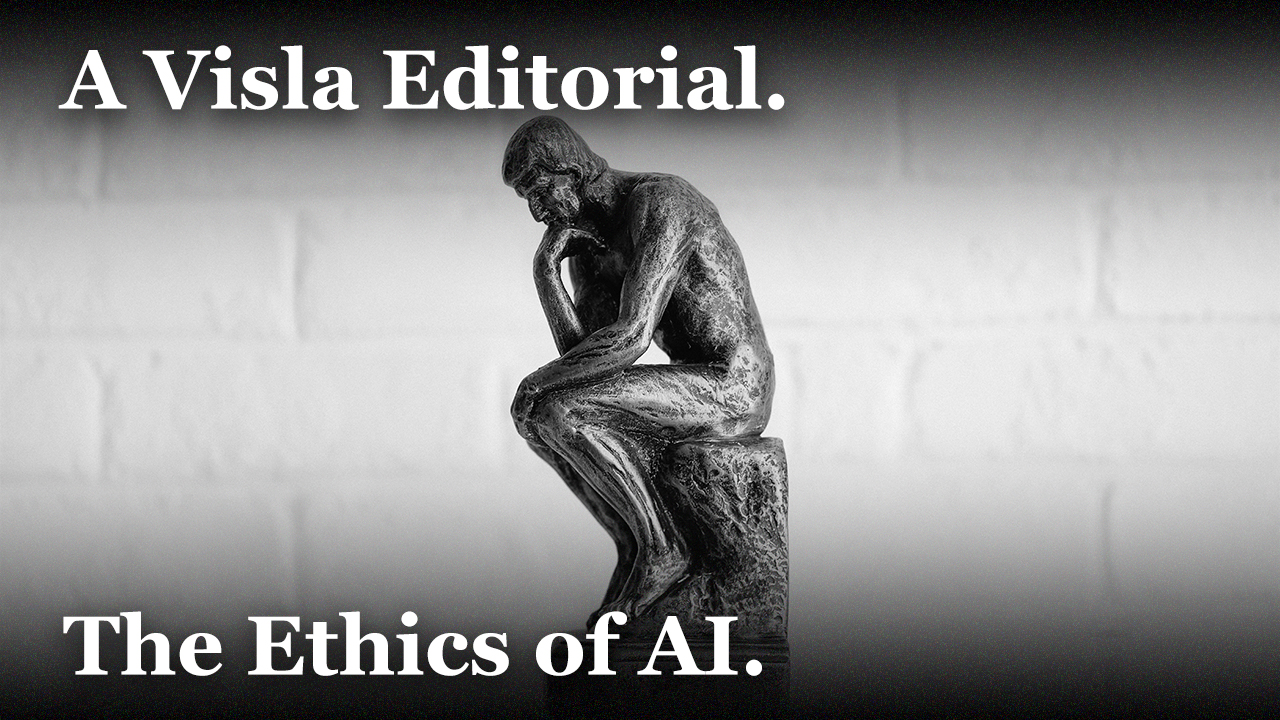Artificial Intelligence (AI) is revolutionizing businesses at an unprecedented pace, driving efficiency and unlocking new avenues for revenue. Yet, as AI becomes increasingly embedded in the fabric of daily operations, it brings to the surface complex ethical challenges that cannot be ignored. From algorithmic bias to job displacement, the ethical landscape of AI presents questions that go beyond mere technological considerations.
The Basics of AI Ethics
Artificial Intelligence is a transformative technology. Imagine software that analyzes data at light speed or algorithms that make supply chain management a breeze. Companies harness AI to boost productivity, optimize operations, and create new revenue streams. The benefits are real and substantial.
However, the rise of AI brings a host of ethical considerations to the forefront. Questions about data privacy, algorithmic bias, and job displacement become central issues. Ethical considerations can’t take a back seat. Addressing them is crucial for long-term, sustainable success. You’re not just programming machines; you’re influencing society and shaping the future.
By understanding AI ethics, businesses not only safeguard their reputation but also pioneer a responsible path for technological innovation. So, the conversation isn’t just about codes and algorithms; it’s also about integrity, accountability, and the broader impact on society.
Key Ethical Issues Around AI
Navigating the world of AI involves more than understanding code and algorithms. Businesses also face pressing ethical dilemmas, from data biases to privacy concerns. Up next: an in-depth look at biases, privacy and security, transparency, job loss, and oversight.
Biases
In the realm of AI, biases can manifest in unsettling ways, leading to unfair discrimination. Take facial recognition technology, for example. Algorithms trained on datasets lacking diversity might misidentify individuals from underrepresented groups, leading to unjust consequences.
Biased AI not only tarnishes a company’s reputation but can also result in legal ramifications. The goal is to root out these biases at the development stage. Companies that strive for ethical AI conduct audits and update their algorithms to mitigate the impact of biases. By doing so, they promote social equality and safeguard the fairness of AI applications.
Privacy and Security
Handling vast amounts of data is par for the course in AI. But this raises the stakes for privacy and cybersecurity. When mishandled, data can become a treasure trove for hackers, leading to identity theft or financial fraud. Data privacy is no longer optional; it’s a requirement for maintaining customer trust and complying with regulations like GDPR.
Businesses must employ robust encryption techniques and conduct regular security audits. This isn’t just about protecting bytes and bits; it’s about safeguarding individuals’ rights and ensuring the secure use of AI.
Transparency
In the rapidly evolving landscape of AI, transparency remains a critical component. Black-box AI that make decisions without explainability can undermine trust and accountability.
Transparency isn’t just good ethics; it’s also good business. Understanding how AI systems reach conclusions helps in troubleshooting, refining algorithms, and providing the kind of explanations that regulations increasingly demand. Businesses that prioritize transparent AI not only stand in good stead with their stakeholders but also set industry standards for ethical conduct.
Oversight
In the case of AI, the margin for error is not just a line of incorrect code; it can mean tangible harm to individuals or communities. Errors like misdiagnosis in healthcare AI or incorrect sentencing recommendations in legal systems can have severe consequences.
Therefore, robust AI oversight mechanisms such as comprehensive testing, auditing, and governance become indispensable. Businesses must adopt frameworks that ensure the ethical use of AI, addressing mistakes before they escalate into crises. Oversight is more than a safety net; it is a foundational element for any responsible AI deployment.
Job Loss
The automation capabilities of AI are double-edged. On one side, there’s efficiency and scalability, but on the flip side, the risk of job displacement looms large. Automating tasks that once required human hands and minds can lead to layoffs and industry upheaval. Traditional job retraining programs often lack the agility to adapt to this fast-paced change, making them slow and inflexible solutions to a very dynamic problem.
However, it’s crucial to remember that automation-induced job loss is not solely an AI issue; it’s a broader economic challenge that has existed for decades. The automation of factory work, for example, led to job loss in manufacturing while simultaneously creating new opportunities in technology and service sectors.
The challenge requires multi-pronged solutions that extend beyond the realm of technology. Comprehensive policies that include robust unemployment benefits, more dynamic job retraining programs, and initiatives like universal basic income (UBI) could be part of the mix. Businesses have a role to play too, by focusing on responsible AI deployment and considering the workforce implications of automating various tasks. The aim is to strike a balance where AI serves as a tool for growth, not a catalyst for unemployment.
Why AI Ethics Matters
In a world where AI continues to break new ground, ethics isn’t just a philosophical question—it’s a business imperative. Ignoring the ethical considerations surrounding AI applications puts your brand at risk, potentially leading to damage that’s difficult to repair. Not to mention, the legal troubles that could stem from biased algorithms or data privacy violations. In short, unethical AI is not just a societal problem; it’s a business liability.
AI has now moved from the fringes to the mainstream, and so has the conversation about its ethical use. Universities, tech conferences, and corporate training programs increasingly include AI ethics in their curriculums. This is not a trend; it’s a necessary evolution. Moreover, government bodies are stepping up their game, drafting regulations that require businesses to follow ethical guidelines in AI applications.
Aligning AI operations with ethical principles also resonates with an increasingly conscientious consumer base. Customers, partners, and stakeholders value responsible business practices. They’re more likely to engage with companies that are proactive about ethical considerations. Think of ethical AI not as a hurdle but as an opportunity—a chance to lead in your industry, build trust, and establish a reputation for doing good while doing well.
Best Practices for Ethical AI
Taking the leap into AI? Fantastic, but ethical considerations should be part of your roadmap from day one. Businesses that integrate ethical principles into their AI strategy benefit on multiple fronts.
Assess Risks and Biases Before Deploying AI
The first step to ethical AI lies in identifying risks and biases inherent in the data and algorithms. Businesses need to conduct comprehensive assessments to understand these issues before launching any AI system. It’s a proactive approach that prevents future headaches and safeguards reputation.
Increase Transparency in Data Practices, Systems
Transparency in how data is collected, stored, and used is critical. Clearly outline your data practices in user agreements and keep the lines of communication open with stakeholders. Transparency serves as the cornerstone of trust and accountability in AI.
Prioritize Robust Data Privacy Protections
Data is the lifeblood of AI, and its protection is paramount. Implement robust encryption techniques, maintain stringent data access protocols, and comply with privacy regulations. A strong data privacy framework isn’t optional; it’s a must.
Align with Emerging Ethical AI Standards
Keep an eye on the evolving landscape of ethical AI guidelines and standards. Whether it’s industry-specific regulations or broader frameworks, alignment with these standards positions your business as a responsible player in the field.
Engage with Multi-Stakeholder Initiatives
Ethical AI is a collective responsibility. Engage with industry experts, regulators, and community leaders to understand different perspectives and shape more holistic AI policies. Collaborative efforts can yield insights and strategies that unilateral approaches might overlook.
The Path Forward
AI presents an enticing array of benefits, from increased efficiency to innovative solutions that redefine business landscapes. However, along with these advantages come ethical complexities that require thoughtful attention. Thankfully, with diligent oversight and well-crafted ethics policies, these risks become manageable challenges rather than insurmountable obstacles.
It’s crucial that all actors in the AI ecosystem, from developers to executives to regulators, take responsibility for the ethical implications of this transformative technology. Shared accountability fosters an environment where AI can be both powerful and ethical.
Done right, AI doesn’t have to be a Pandora’s box of ethical quandaries. Instead, it can be a tool that empowers people, enriches communities, and propels businesses into new horizons of success and innovation. So, as you move forward, make ethics a co-pilot on your AI journey, ensuring a trajectory that respects both human values and business objectives.
AI, Ethics, and You
In the fast-paced world of AI, an ethical framework isn’t a luxury; it’s a necessity. While the technology offers immense opportunities for business growth and societal advancement, a cautious approach is imperative. Acting responsibly doesn’t inhibit innovation; rather, it ensures that progress is both sustainable and just. As AI innovation surges ahead, ethics can’t be left in the rearview mirror.


Leave a Reply
You must be logged in to post a comment.